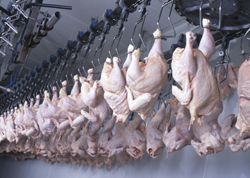Waste not, want not in the European food industry
Despite the tightening of food supplies amid burgeoning populations and climate change, prosperous Europe continues to waste enormous amounts of food. For example, when producing meat for human consumption, up to half the weight of the animal is lost. The total leftover mass in the meat industry in a year is a massive 15 million tonnes in the EU alone. Although much of this has always been discarded, it nevertheless represents a rich source of proteins and lipids. Employing current recovery techniques, the meat industry only manages to transform about one fifth of this into feed and only 3 % into food. Conventional rendering technologies heat the leftovers for long periods to kill microbes and increase digestibility. This not only consumes enormous amounts of energy but also degrades some of the meat. Financed by the EU, the PROSPARE project sought to improve recovery in the poultry industry by developing and applying new technologies and techniques. The system developed by this joint Euro-Russian project transforms proteic leftovers into functional animal proteins for use in food. It also converts feathers into functional feather proteins for feed, while fat is transformed into biodiesel. PROSPARE developed a lab-scale plant for the recovery of proteins from feathers, which was later scaled up to pilot level. The digestibility of the feed produced by the prototype was over 85 %, while tests confirmed that the output was completely decontaminated. The project also developed a pilot plant in Moscow, Russia to convert on a daily basis up to 2.1 tonnes of bone and meat into functional animal proteins and fat. This novel system can recover up to 70 % of the proteins potentially available in poultry leftovers. Finally, PROSPARE developed technology to transform the resultant fat into biodiesel using a heterogeneous base catalyst mounted on a fixed bed at high temperature and pressure. This technique allowed for better conversion than conventional approaches, although enhancements were required to remove contaminants and impurities. PROSPARE's innovative prototype technologies are set to pave the way for a new generation of recovery systems eliciting a high level of interest both in academic and industrial circles.

